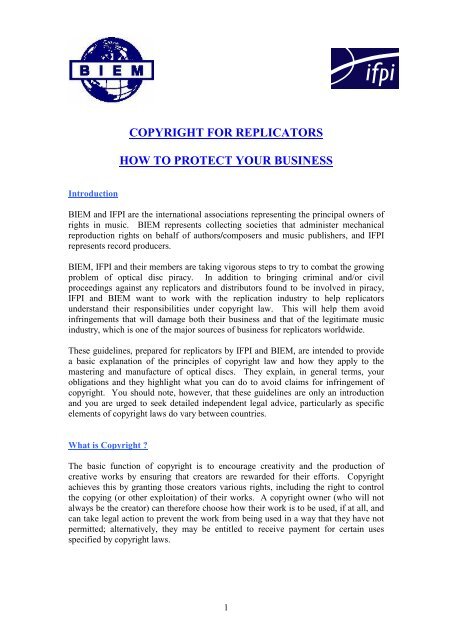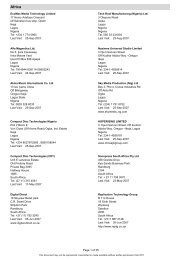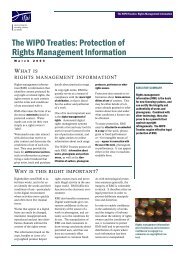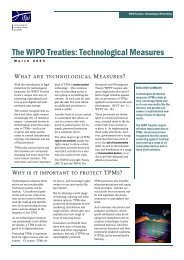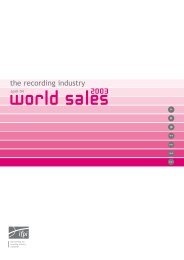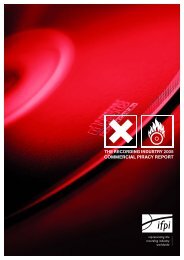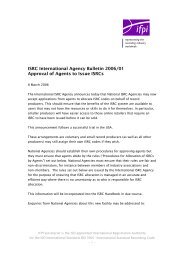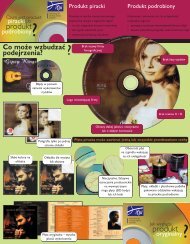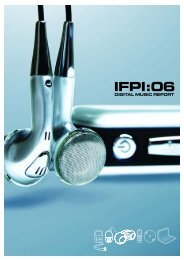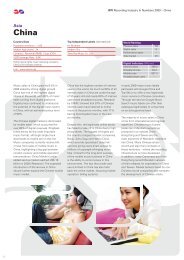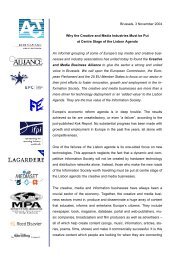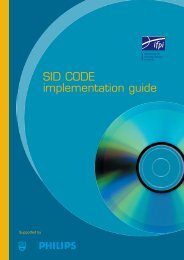Copyright For Replicators - How To Protect Your Business - IFPI
Copyright For Replicators - How To Protect Your Business - IFPI
Copyright For Replicators - How To Protect Your Business - IFPI
Create successful ePaper yourself
Turn your PDF publications into a flip-book with our unique Google optimized e-Paper software.
COPYRIGHT FOR REPLICATORS<br />
HOW TO PROTECT YOUR BUSINESS<br />
Introduction<br />
BIEM and <strong>IFPI</strong> are the international associations representing the principal owners of<br />
rights in music. BIEM represents collecting societies that administer mechanical<br />
reproduction rights on behalf of authors/composers and music publishers, and <strong>IFPI</strong><br />
represents record producers.<br />
BIEM, <strong>IFPI</strong> and their members are taking vigorous steps to try to combat the growing<br />
problem of optical disc piracy. In addition to bringing criminal and/or civil<br />
proceedings against any replicators and distributors found to be involved in piracy,<br />
<strong>IFPI</strong> and BIEM want to work with the replication industry to help replicators<br />
understand their responsibilities under copyright law. This will help them avoid<br />
infringements that will damage both their business and that of the legitimate music<br />
industry, which is one of the major sources of business for replicators worldwide.<br />
These guidelines, prepared for replicators by <strong>IFPI</strong> and BIEM, are intended to provide<br />
a basic explanation of the principles of copyright law and how they apply to the<br />
mastering and manufacture of optical discs. They explain, in general terms, your<br />
obligations and they highlight what you can do to avoid claims for infringement of<br />
copyright. You should note, however, that these guidelines are only an introduction<br />
and you are urged to seek detailed independent legal advice, particularly as specific<br />
elements of copyright laws do vary between countries.<br />
What is <strong>Copyright</strong> ?<br />
The basic function of copyright is to encourage creativity and the production of<br />
creative works by ensuring that creators are rewarded for their efforts. <strong>Copyright</strong><br />
achieves this by granting those creators various rights, including the right to control<br />
the copying (or other exploitation) of their works. A copyright owner (who will not<br />
always be the creator) can therefore choose how their work is to be used, if at all, and<br />
can take legal action to prevent the work from being used in a way that they have not<br />
permitted; alternatively, they may be entitled to receive payment for certain uses<br />
specified by copyright laws.<br />
1
What does <strong>Copyright</strong> apply to ?<br />
<strong>Copyright</strong> can apply to a variety of creative works, from books, sculptures, paintings,<br />
films, music, sound recordings and photographs to computer programmes, technical<br />
designs and databases.<br />
<strong>For</strong> optical disc replicators, the most important of these are likely to be music, films,<br />
computer games and business software. These guidelines concentrate on music.<br />
What rights are there in a recording of music?<br />
It is important to understand that when reproducing a recording of music, there are<br />
two separate copyrights to consider:<br />
• The right of the producer of the sound recording itself; and<br />
• The right of the author/composer (or their publisher) in the underlying<br />
composition (ie. the song or musical work and/or the lyrics)<br />
Depending on the country in which you are located, the rights of the producer of a<br />
sound recording may be protected as “related rights” or “neighbouring rights”, rather<br />
than as copyright. Such copyrights or neighbouring rights are usually owned by the<br />
record company which produced and commercially released the sound recording.<br />
The right to reproduce the composition is often known as the “mechanical copyright”<br />
and such rights are usually administered by collecting societies representing the<br />
authors/composers who created them and their publishers.<br />
What rights does the owner of a copyright or neighbouring right have ?<br />
The owner of a copyright or neighbouring right will have the right to control the<br />
exploitation of its composition and/or sound recording and prevent a number of acts<br />
which relate to the ways in which the composition and/or sound recording can be<br />
exploited. These include:<br />
• The right to copy or reproduce on a commercial basis;<br />
• The right to distribute copies to the public;<br />
• The right to import or export copies; and<br />
• The rights in public performances.<br />
Therefore, it is only the owner of a copyright or neighbouring right in a sound<br />
recording that can, for example, copy a sound recording on a commercial basis<br />
(subject to clearance of the mechanical copyright), and the copyright owner can take<br />
legal proceedings to stop anyone else from copying that sound recording.<br />
Alternatively, the copyright owner may grant a licence to another person to copy the<br />
sound recording, usually for a fee. The same principles apply to the owner of the<br />
mechanical copyright. It is usually collecting societies that grant the licence to copy<br />
the composition.<br />
2
<strong>How</strong> do copyrights or neighbouring rights affect me ?<br />
When you manufacture (and therefore reproduce) sound recordings, whatever the<br />
format (eg. CD, DVD, CD-ROM), if the owners of the copyright or neighbouring<br />
rights which apply to those sound recordings and/or the underlying compositions have<br />
not granted a licence for that reproduction, you (the replicator) will have infringed<br />
those copyright(s) or neighbouring rights. Even if you have obtained a warranty<br />
and/or declaration from your customer that he has obtained all the necessary rights for<br />
the order, or even an indemnity regarding any legal claims, it is you who will be<br />
performing the actual copying and you who will be responsible for it, as wall as<br />
perhaps also the distribution and exportation.<br />
Remember as well that if you are dealing with a sound recording that has been<br />
released by a record company, there will need to be clearance of two separate rights,<br />
in the composition and the sound recording itself.<br />
If you fail to check that both of these rights have been cleared, you may find yourself<br />
the subject of either a criminal prosecution or a civil claim for damages. Either way,<br />
the penalties, both financial and commercial, can be severe.<br />
What can you do to avoid infringing copyrights or neighbouring rights ?<br />
You need to ensure that, before you process any order involving content that may be<br />
protected by copyright or neighbouring rights, the owners of those rights have granted<br />
a licence for that reproduction.<br />
When dealing with sound recordings, this means that your customer needs to show<br />
you evidence that he has a licence from the owner of the rights in the composition<br />
AND from the owner of the rights in the sound recording. In addition, that evidence<br />
must be reasonable in the circumstances if you are to protect your position; for<br />
example, it will not normally be reasonable to accept a mere declaration from your<br />
customer that he owns, or has a licence from the owner of, the producer’s rights.<br />
Usually, the mechanical copyrights will be licensed to your record company customer<br />
by a collecting society in the country where you are based or in the country where<br />
your customer is based, and will be provided in the form of either (i) a standard<br />
contract between your customer and that society or (ii) a specific authorisation to your<br />
customer from that society. But if the record company customer has failed to obtain a<br />
license, you risk being held responsible for infringing reproduction (manufacture).<br />
Collecting societies often have agreements or codes of practice with replicators,<br />
dealing with the rules for verification and exchange of information, and it is vital that<br />
you observe those agreements or codes if you are to avoid problems. <strong>How</strong>ever, it is<br />
important to understand that these agreements or codes will not cover the owner of the<br />
rights in the sound recording, and your customer will need to either produce<br />
satisfactory evidence of a licence from that owner or show that he is the owner.<br />
3
<strong>To</strong> avoid any possible doubt, although <strong>IFPI</strong> and BIEM concluded in 1996 a<br />
Memorandum of Understanding on Anti-Piracy, (providing for cooperation between<br />
the two organisations on anti-piracy matters) that agreement does not in any way<br />
affect or lessen the obligation on replicators and their customers to ensure that both<br />
the rights in the composition and the sound recording have been properly cleared.<br />
<strong>To</strong> be specific, if you receive an order from a customer that has a mechanical licence<br />
from a collecting society, this does not mean that you can assume that a licence has<br />
been obtained from the owner of the rights in the sound recording. You must still ask<br />
for and obtain evidence of authorisation from the owner of the rights in the sound<br />
recording before you process the order. Likewise, if you receive an order from a<br />
customer that has a licence from a record producer you must still ask for and obtain<br />
evidence of a licence from a collecting society for the underlying composition.<br />
<strong>How</strong> do you do this ?<br />
As regards rights in sound recordings, <strong>IFPI</strong> recommends that you follow the<br />
guidelines set out in its Good <strong>Business</strong> Practices for CD Mastering and Manufacturing<br />
Plants.<br />
As regards mechanical copyrights, whilst many of the principles contained in the<br />
Good <strong>Business</strong> Practices are equally applicable, you should also consult with your<br />
local collecting society (or other relevant society) to clarify its specific licensing<br />
procedures<br />
In addition, the optical disc replication industry has produced the IRMA (International<br />
Recording Media Association) Anti-Piracy Compliance Standards & Procedures,<br />
which have been put together in consultation with the recording, film and computer<br />
software industries. These guidelines and procedures will help you to ensure that<br />
adequate checks are carried out to detect any suspect orders, before they are<br />
processed, and therefore avoid infringing copyrights.<br />
Contact Information:<br />
Samantha Wright<br />
Ronald Mooji<br />
<strong>IFPI</strong> Secretariat<br />
BIEM<br />
54/62 Regent Street 14, Rue Lincoln<br />
London<br />
F-75008 Paris<br />
W1B 5RE<br />
France<br />
Tel: +44 (0) 20 7878 7900 Tel: +33 1 53 93 67 00<br />
Fax: +44 (0) 20 7878 7950 Fax: +33 1 45 63 06 11<br />
Email: cdplant@ifpi.org<br />
Web: www.ifpi.org<br />
The information contained in these guidelines is for information purposes only.<br />
Neither <strong>IFPI</strong> nor BIEM can accept liability for any loss of whatever nature<br />
arising or perceived to have arisen out of a reliance on these guidelines.<br />
4


